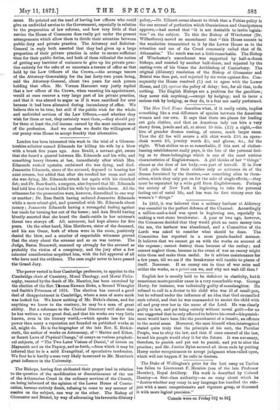English law is usually held to be deficient in elasticity,
but it sometimes meets peculiar cases in a very remarkable way. George Hurry. for instance, was technically guilty of manslaughter. He refused to call in a doctor to his child who was ill of small-pox, but he refused under the influence of an idea that God counselled such refusal, and that he was commanded to anoint the child with oil and pray over her in the name of the Lord. He was clearly guilty in law, and yet being entirely without moral guilt—for no one suggested that he only affected to believe his creed—his punish- ment would have been like the punishment of a lunatie, an offence to the moral sense. Moreover, the man himself when interrogated stated quite truly that the principle of his sect, the Peculiar People, was to obey the law, and that if once assured of the law, he and his people would obey it for the future. It was necessary, therefore, to punish and yet not to punish, and yet to alter the practice; and Mr. Justice Byles secured all these ends by putting Hurry under recognizances to accept judgment when called upon, which will not happen if he calls in doctors.


































 Previous page
Previous page